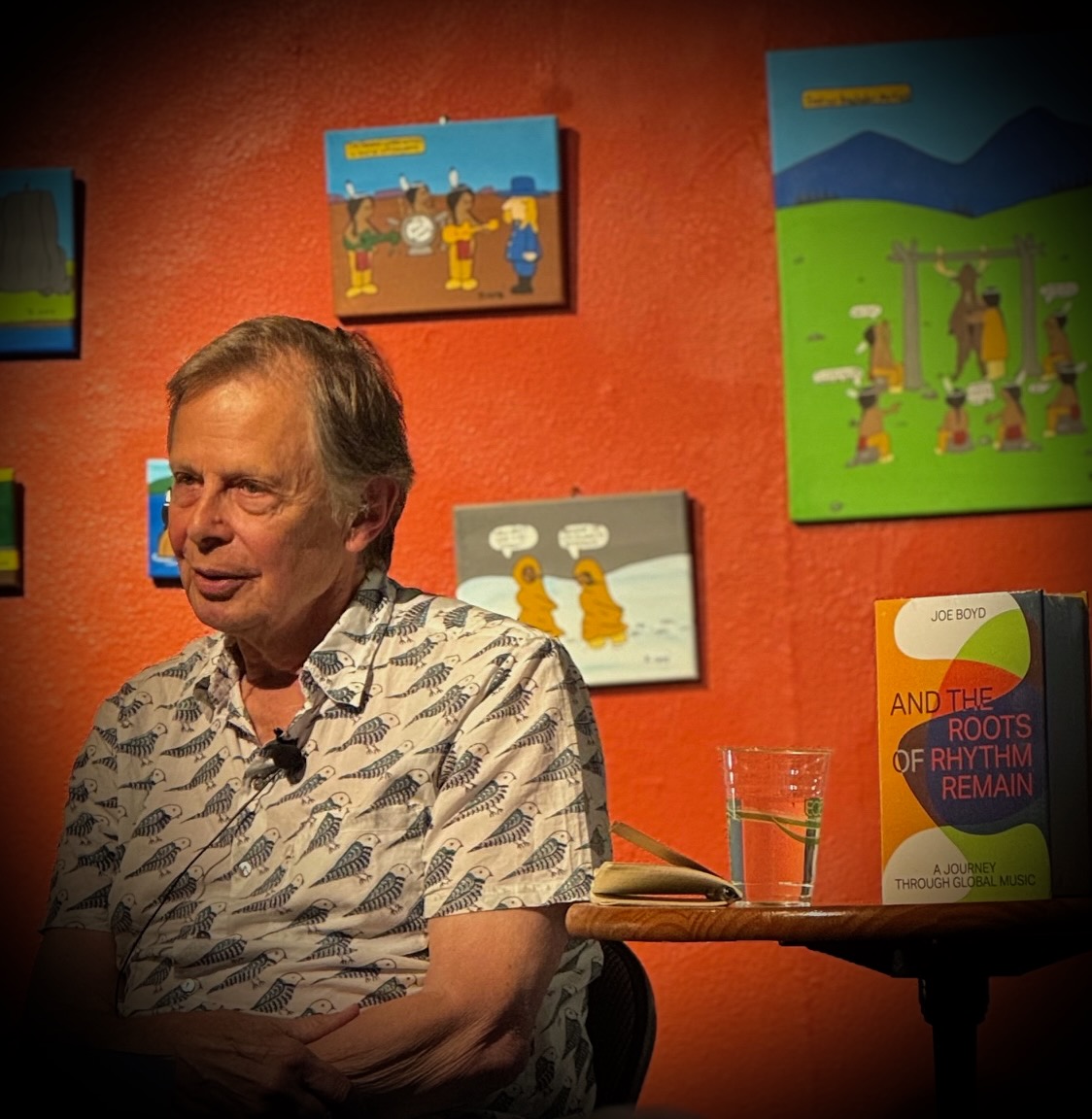
30 Sep Joe Boyd
What can I tell you of Joe Boyd? Well, I don’t think that I would be overstating it to say that the man is a legend, but he’s kind of a stealth legend. Music people know about Joe, which isn’t at all surprising given that his extraordinary career is now into its seventh decade, but he’s one of those guys who a lot of people aren’t necessarily aware that they’re aware of… if you get my drift. If you’ve listened to music or watched movies to any depth since around 1966 or so, it’s very likely that you’ve heard or seen Joe’s work.
Joe started out in the early ‘60s, promoting blues concerts while he was a student at Harvard followed by a stint working for the music festival impresario George Wein. Joe was the stage manager when Bob Dylan ‘went electric’ at the 1965 Newport Folk Festival. In the mid ‘60s Joe ran tours in Europe for Wein featuring the likes of Muddy Waters, Sister Rosetta Tharpe, Coleman Hawkins, the Rev. Gary Davis, Stan Getz and others. He found life in Blighty to be sympathetic and he lived in London for a number of years at height of the Swinging London scene. He co-founded the famed UFO club in London, an institution that boasted a house band by the name of Pink Floyd. Perhaps you’ve heard of them. Joe’s first sessions as a producer were for Eric Clapton and the Powerhouse followed by Pink Floyd’s first single, Arnold Layne. Fairport Convention, The Incredible String Band, Nico, Richard & Linda Thompson, Soft Machine, Vashti Bunyan, the McGarrigle sisters, Defunkt, Toots & the Maytals, R.E.M., 10,000 Maniacs, Billy Bragg, Robyn Hitchcock—Joe has worked with all of them and many many more. Joe discovered, produced and managed Nick Drake, fer crissakes, which in itself might well be sufficient to secure his status in the pantheon of greats.
Look through the index in Joe’s excellent 2006 memoir White Bicycles: Making Music in the 1960s, and you’ll see just about every significant name in post-war blues, jazz, folk and rock listed there. The book’s front cover blurb is from no less than Brian Eno, who opines ‘The best book about music I have read in years.’
Returning to the US of A in 1970, Joe worked for Warner Brothers and was the producer/co-director of the 1973 film A Film About Jimi Hendrix, which may well be the first rockumentary to focus on the life and work of a single artist. The Hendrix film was, of course, preceded by numerous concert documentaries (Monterey Pop, Woodstock, Gimme Shelter, etc.), but if there’s an earlier biographical rock and roll film I can’t think of what it might be. He collaborated with Stanley Kubrick on the soundtrack for A Clockwork Orange and produced the music for the film Deliverance (remember Dueling Banjos?—yep, that was Joe).
By 1980 Joe had founded Hannibal Records and its subsidiary label, Carthage. Hannibal put out new material (Richard & Linda Thompson’s 1982 classic Shoot Out out the Lights being of particular note) and Carthage reissued classic elpees of English folk rock material originally released on Island Records. I was a 20-something knucklehead living in Albuquerque at the time and at some point—I have no recollection of precisely where or when—I got to know a lovely chap by the name of John Boyd. John, it turned out, was the younger brother of Joe. John and I hit it off well and we put together a short-lived concert promotion venture by the name of Punic Productions (Hannibal, Carthage, Punic… get it?). We produced just a couple of shows—a Richard Thompson concert and another by the legendary Trio Bulgarka—for which I did the leg work and John supplied the financing. Punic Productions proved to be a highly effective way to hear some great music and lose a fair chunk of money into the bargain.
At some point in the late ‘80s I was beginning to despair of making any kind of a reasonable living in the music business in Albuquerque. I had played in bands, toured the country as a sound man/guitar roadie, worked as a journalist, was present from the inception of the great Bow Wow Records through its heyday as an alt/punk concert promotion mecca, had become the executive director of the New Mexico Jazz Workshop—all of it adding up to a big, fat NOTHING. Casting around for some sort of way to advance my cause I hatched the fantasy of moving to the East Coast and throwing myself upon the mercy of Joe Boyd. I loved the Hannibal and Carthage labels and everything they did. I was willing to sleep on the office floor, answer the phones, make the coffee, pick up Joe’s dry cleaning—whatever. Was there even a Hannibal Records office? Hell if I knew, but Joe was a hero to me and I had an actual connection to the great man. It was worth a try.
If memory serves, I prevailed upon John to reach out to his brother on my behalf: Idealistic/naive music biz flunky from the boondocks available for hire! The reply came back in short order: Thanks, But No Thanks. Perhaps if I had already been resident in the New York City area there might have been a bit of a chance, but the notion that I should give up everything to move to Gotham on the vague hope that something might work out for me in the record biz was finding no takers. No one wanted to be party to that folly, and I didn’t particularly want to end up sleeping on a piece of cardboard in the Port Authority Bus Terminal if things didn’t pan out. Oh well.
So, life went on. Things have worked out fairly well for me in the art business and I have no regrets (well… not too many), but music remains my first and truest love. John still resides in Albuquerque and is recently retired from law practice. Joe remains a busy man—an éminence grise and highly regarded author and podcaster. I finally got to meet Joe in Santa Fe back in 2011 during a tour with Robyn Hitchcock inspired by White Bicycles. Joe read passages from his book and Robyn played guitar and sang songs from the era. John came up from Albuquerque for the event and graciously introduced me to everyone. It turned out that many people—Joe and Robyn prominent among them—refer to the person I have always called ‘John’ as ‘Warwick’ (or ‘Worrick,’ as Robyn pronounces it). I stand corrected, but Worrick will always be ‘John’ to me.
I crossed paths with Joe again just last week. He has a new book out titled And the Roots of Rhythm Remain: A Journey Through Global Music. Joe has put over a decade of writing, travel and research into this project and I look forward to diving in. The new tome weighs in at a mighty 940-plus pages, which might seem a bit intimidating but Joe is nothing if not a great raconteur. There will undoubtedly be fascinating historical info and illuminating insights, but also many great stories to bring it all to life. The cover blurbs for Roots of Rhythm are supplied by Brian Eno (again), Ry Cooder, David Byrne, T. Bone Burnett and Robert Plant. Not bad.
There’s so much more to say and so much more to know about Joe and his work—dig into his Wikipedia page and check out his website (www.joeboyd.co.uk). The depth and breadth of the man’s career is genuinely astonishing. I mean, this is the guy who put Kate Bush together with Yanka Rupkina and the Trio Bulgarka back in 1989! The mind doth well and truly boggle. Rock on, Joe!
